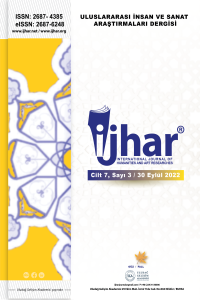Üniversite Öğrencilerinin Okuldan Memnuniyet Düzeyleri ve Akademik Başarıları Arasındaki İlişki: Fen Bilgisi Öğretmenliği Örneği
Son yıllarda devlet üniversitelerinin yanı sıra özellikle vakıf ve özel üniversitelerin sayısındaki artış sonucu üniversiteler arası rekabet ortamı doğmuştur. Bu rekabet ortamında üniversiteler öğrenciler tarafından tercih edilebilmek için kaliteli eğitimin yanı sıra, öğrencilere sundukları olanaklar ile de gündeme gelmektedir. Global dünyada nitelikli, yetişmiş öğrencilere olan ihtiyacın artması ile üniversitelere yapılan yatırımın, eğitim kalitesinin ve memnuniyet çalışmalarına olan ilginin de arttığı görülmektedir. Üniversite sınavında daha yüksek puanla öğrenci kabulü yapan ve kaliteli eğitim hizmeti verdiği düşünülen üniversitelerin mezunları, daha nitelikli kabul edildikleri için bu tür üniversitelerden mezun olan gençler bu daha kolay istihdam olanağı sağlayabilmektedir. Bu sebeple öğrencilerin kaliteli eğitim verdiği düşünülen üniversiteleri daha fazla tercih edecekleri aşikardır. Eğitimde kaliteye önem veren üniversiteler için öğrenciler tarafından nasıl değerlendirildikleri önemlidir. Öğrencilerin değerlendirmeleri eğitimin kalitelisini tespit etmede tek bilgi kaynağı olmamakla birlikte yararlı bilgiler sağlar. Bu araştırma; Bursa Uludağ Üniversitesi Eğitim Fakültesi Fen Bilgisi Öğretmenliğinde öğrenim görmekte olan 2, 3 ve 4. sınıf öğrencilerinin okuldan memnuniyet düzeyleri ile akademik başarıları arasında anlamlı bir ilişkinin olup olmadığını incelemek amacıyla yapılmıştır. Çalışma nicel araştırma yöntemlerinden tarama yöntemi ile yürütülmüştür. Araştırmanın örneklemini 2021-2022 güz yarıyılında öğrenim gören, araştırmaya katılmaya gönüllü olan ve formları eksiksiz dolduran 2.sınıf öğrencilerinden 48 kişi, 3.sınıf öğrencilerinden 36 kişi ve 4.sınıf öğrencilerinden 21 kişi olmak üzere toplam 105 fen bilgisi öğretmen adayları oluşturmuştur. Veri toplama aracı olarak ‘‘A Öğrenci Memnuniyet Ölçeği’’ kullanılmıştır. Toplanan veriler SPSS 28.0 paket programı ile analiz edilmiştir. Öğrencilerin akademik başarıları ve memnuniyet durumları betimsel istatistiklerle yorumlanmıştır. Yapılan istatistiki analizlere göre Fen Bilgisi öğretmen adaylarının okuldan memnuniyet düzeyleri ile akademik başarıları arasında istatiksel olarak anlamlı anlamlı bir ilişki bulunamamıştır.
The Relationship Between School Satisfaction Levels and Academic Achievement of University Students: The Example of Science Teaching
In order to meet the demand for higher education in our country, an environment of competition between universities has emerged as a result of the increase in the number of private and state universities in recent years. In this competitive environment, universities come to the fore with the opportunities they offer to students as well as quality education in order to be preferred by students. With the increase in the need for qualified, trained students in the global world, it is seen that the investment made in universities, the quality of education and the interest in satisfaction studies also increase. Since the graduates of universities that accept students with higher scores in the university exam and are thought to provide quality education services are considered more qualified, such universities can provide easier employment opportunities. For this reason, students are expected to prefer universities that are thought to provide quality education more. There are many factors that determine the university preferences of students. Among these, there are factors such as the academic success of the university, its campus, student life, job opportunities of graduates, and opportunities within the departments. In this context, it is assumed that students will choose a university that suits their career goals and personal preferences (Egelioğlu, Arslan, & Bakan, 2011). Student satisfaction is accepted as an important data in terms of the quality of undergraduate education given by universities. (Uygur & Yelken 2017). Because satisfaction that students receive from education is considered as an indicator of the quality of the educational institution. For this reason, most universities pay attention to regularly conducting satisfaction surveys to evaluate their efforts in quality improvement processes and to improve their service quality. For universities that care about quality in education, it is important how students are evaluated. Student assessments are not the only source of information in determining the quality of education, but they provide useful information. Although there are many studies on the concepts of student satisfaction and academic success (Altaş, 2021; Alver, 2005; Şahin, Zoraloğlu and Fırat, 2011; Naralan and Kaleli, 2012; Burgaz and Ekinci, 2007; Jafarova and Demirtaş, 2020) there are few studies examining the relationship between these two concepts both in our country and in the world literature (Egelioğlu, Arslan and Bakan, 2011; Koç and Arkan, 2021; Edraki et al., 2011; Samdal et al., 1999). For this reason, in this study, it was desired to investigate the relationship between prospective science teachers' levels of satisfaction with school and their academic achievements. For this reason, it was desired to seek answers to some research questions. These are: 1) Is there a significant relationship between pre-service science teachers' level of satisfaction with school and their academic achievement? 2) How academically successful are the pre-service science teachers? 3) What is the level of satisfaction of pre-service science teachers from school? ). Pearson correlation analysis was applied to determine the relationship between the two. In this study, which was conducted to examine the relationship between the academic achievement scores of science teacher candidates and their satisfaction with school, no statistically significant relationship was found between students' school satisfaction and academic achievement scores.
___
- Altaş, D (2006). Üniversite Öğrencileri Memnuniyet Araştırması. Marmara Üniversitesi İktisadi ve İdari Bilimler Dergisi, 21(1): 439-458.
- Altun M, Bozkurt I (2020). İstatik ve istatistiksel yorumlama teknikleri. Alfa Aktüel Yayınları, Bursa
- Alver, B (2005). Üniversite öğrencilerinin problem çözme becerileri ve akademik başarılarının çeşitli değişkenlere göre incelenmesi. Marmara Üniversitesi Atatürk Eğitim Fakültesi Eğitim Bilimleri Dergisi, 21(21): 75-88.
- Archibald, S (2006). Narrowing in on educational resources that do affect student achievement. Peabody Journal of Education, 81(4): 23-42.
- Bacıoğlu S D, Vural L (2018). Öğretmen Adaylarının Akademik Hizmetlere İlişkin Görüşleri Ve Memnuniyet Düzeyleri. Mehmet Akif Ersoy Üniversitesi Eğitim Fakültesi Dergisi. (47): 158-178. https://doi.org/10.21764/maeuefd.364465
